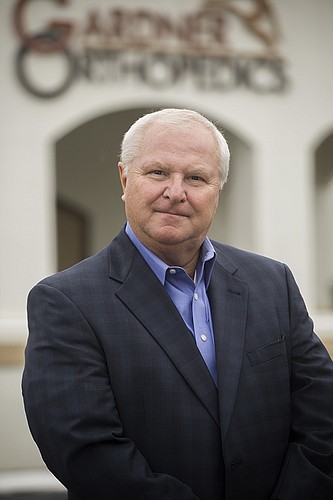- December 25, 2024
-
-
Loading

Loading

STEVE CUNNINGHAM
Qualifying Broker, LandQwest Commercial
Fort Myers and Tampa
As the qualifying broker for LandQwest Commercial, Steve Cunningham overseas the brokerage's entire operation, from strategic planning to operational analysis. He also heads the company's operational structure. A holder of MAI and CCIM real estate designations, Cunningham has been active in Southwest and Central Florida's sales, leasing and consulting markets since 1976. He spoke to the Business Observer this month about the commercial real estate market Lee and Collier counties.
Markets nationwide are being described as “frothy” and “foamy” -- especially for asset classes such as multifamily, hospitality and senior housing. What's your sense of the market there?
In general, what we're seeing in multifamily and in hotels is that they're benefitting from today's robust economy. In terms of both occupancy and average daily rates, hotels have rebounded significantly, and as a result investors are buying and, in some cases, finding that supply is not available to them. Overall the demand curve is greater than the supply in hotels, multifamily projects and senior housing. On multifamily projects, we're seeing multiple offers for properties at attractive cap rates. So the market there is moving with high velocity. And in senior housing, we get calls from all over the country asking about that asset class, because of our demographics and aging population in Florida.
This year marks the sixth year of a growth cycle. Are you seeing any inflection point in the markets in Lee and Collier?
Florida is traditionally the last to enter an economic recession and it's the first to come out of one, and that's the case now, too, and we're also insulated, to a degree, because of our population growth. What concerns me more is the falling price of oil and the stock market correction. I don't see our growth cycle ending anytime soon. We're still in a growth stage.
Is there a wide disparity between the asking prices sellers are seeking and the prices buyers seem willing to pay?
I do believe there's a big disparity, and it's across the board, in all asset classes. There's a general “feel good” perception among sellers. Many are saying, well, historical sales and comps are nice to look at, but I think I'd rather look at the last comparable sale and bump it up by 25%. Buyers, not surprisingly, are saying “Woah!” and it's creating a paralyzed market.
CBD office buildings and industrial space have been especially healthy throughout Florida. How about in Collier and Lee counties?
The Naples office market, in particular, has been hot. It's a very dynamic market there. Office space in Lee County, conversely, has been slower to recover, and we've not seen a lot of new space built. The same has held true, to a degree, in the industrial sector. There's been virtually no new industrial stock built there since the recession, so there's been a gradual increase in the price of land and sales per square foot. And there's been a huge demand for small, “flex” units of roughly 2,000 square feet. Those properties are seeking prices of $100 per square foot, whereas they had been $40 per square foot during the recession. That said, rental rates are not at the point where it makes sense yet to build, so all existing spaces are being filled. The same is true for office space. It continues to be absorbed and rates are increasing slowly, though not enough to justify new construction.
Multifamily investments have ridden a demographic wave to new heights in this cycle. Some contend the sector is becoming overheated. What are your thoughts?
Multifamily is a tried-and-true investment, and it's insulated to a degree, to recession. One only has to look at all the new projects being built in Fort Myers to see the evidence. People have to live somewhere, and today, many people are being priced out of buying a home. But I wouldn't say it's overheated here at all. In Southwest Florida, we've seen occupancy rates and rents rise to all-time highs, and I don't see the new construction that's occurring creating an oversupply. There will always be a significant demand for multifamily in Southwest Florida.
What's the retail market like there?
Retail is probably the most dynamic sector of all in this region. One has to include Wawa and the growth of Starbucks and others in any analysis. With the population growth we've had, retailers are taking notice and coming in.
Distressed and REO properties dominated the commercial real estate landscape in Florida for years beginning in 2008, but many of those properties have largely cycled through and been resold. Is that the case in Southwest Florida?
Southwest Florida was really the epicenter of the foreclosure debacle beginning in 2008 — we had multiple foreclosures in every asset class — but today distressed deals are almost non-existent.
Many analysts say this cycle differs from the last in that most investors are relying less on bank debt and are paying cash for properties. Is that the case in Collier and Lee counties?
Yes. Most purchases these days are cash purchases. Investors regrouped coming out of the recession and bought at attractive prices without incurring bank debt. And the banks today are being a lot more cautious. They're measuring collateral now a lot more closely. And appraisal decisions are being based more on a system of checks and balances than they had been.
Do you agree that commercial real estate in Florida seems poised for another solid year in 2016?
Our shop did $150 million in sales last year and we hope to repeat in 2016. Overall, I am cautiously optimistic. I'm not advising any buyer to blindly buy any asset, and buyers seems to be doing greater feasibility analysis with every asset purchase.
— K.L. McQuaid